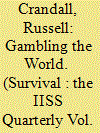| Srl | Item |
| 1 |
ID:
188808


|
|
|
|
|
| Summary/Abstract |
From North Korea to Ukraine to Iran, the spectre of nuclear war continues to loom over global affairs. In his timely history Nuclear Folly, Harvard historian Serhii Plokhy takes a fresh and intentionally international look at one of the most fraught moments of the Cold War: the Cuban Missile Crisis. Contrary to the conventional view that US president John F. Kennedy brilliantly out-foxed his inept Soviet counterpart, Nikita Khrushchev, Plokhy posits that both sides repeatedly erred and misread each other – greatly increasing the likelihood of mutual annihilation. Plokhy draws lessons from the crisis for contemporary decision-makers, noting that the power to wield nuclear weapons still resides in a small number of hands.
|
|
|
|
|
|
|
|
|
|
|
|
|
|
|
|
| 2 |
ID:
149501


|
|
|
|
|
| Summary/Abstract |
KEVIN EVANS and BRYAN MARSHALL analyze “signing statements” from John F. Kennedy to George W. Bush and find that presidents are more likely to give credit to members of Congress for legislative accomplishments when political conditions make bill passage difficult. They show that presidents strategically share credit with key coalition members, party leaders, co-partisans, and senators in order to support their coalition and party-building needs in Congress.
|
|
|
|
|
|
|
|
|
|
|
|
|
|
|
|
| 3 |
ID:
184984


|
|
|
|
|
| Summary/Abstract |
During the 2016 US presidential campaign, candidate Donald Trump suggested the United States could benefit from a more unpredictable foreign policy. The assassination of Iranian Major-General Qasem Soleimani by US forces in 2020 during the Trump administration may be the best recent example of this doctrine in action. Other American presidents, including John F. Kennedy, Richard Nixon and Bill Clinton, have applied it in different ways. Historical comparisons of its use in the Cuban Missile Crisis and the conflicts in Vietnam and Kosovo suggest that the expected liabilities of the strategy outweigh any likely gains. Russian President Vladimir Putin appears to be seeking to establish strategic unpredictability by threatening NATO with nuclear escalation should it interfere heavily in Russia’s war in Ukraine. This threat, however, has not deterred NATO from providing effective assistance to Ukraine. Policymakers should be deeply sceptical about the benefits of strategic unpredictability.
|
|
|
|
|
|
|
|
|
|
|
|
|
|
|
|